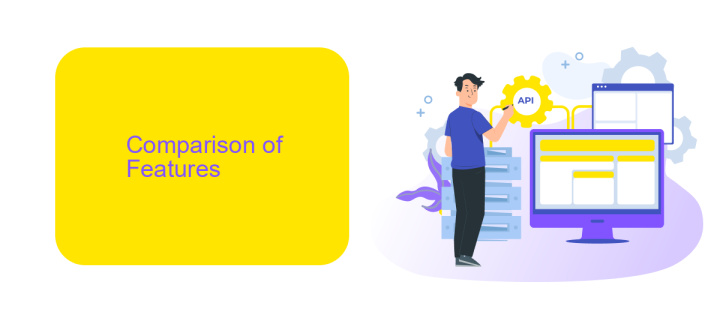Tibco Vs Denodo
In today's data-driven world, businesses require robust data integration and management solutions to stay competitive. Tibco and Denodo are two leading platforms in this arena, each offering unique features and capabilities. This article aims to compare Tibco and Denodo, examining their strengths, weaknesses, and suitability for different organizational needs, helping you make an informed decision for your data strategy.
Introduction
In the modern digital landscape, businesses are increasingly relying on data integration and management platforms to streamline their operations and make informed decisions. Tibco and Denodo are two prominent players in this arena, each offering unique features and capabilities to address various data challenges.
- Tibco: Known for its robust integration and analytics tools, Tibco provides solutions that enable seamless data connectivity and real-time insights.
- Denodo: Specializes in data virtualization, allowing organizations to access and manipulate data across multiple sources without the need for physical data movement.
Choosing between Tibco and Denodo can be a daunting task, as both platforms offer distinct advantages. Additionally, services like ApiX-Drive can further enhance your data integration efforts by providing easy-to-use automation tools that connect various applications and services. Understanding the strengths and limitations of each platform is crucial for making an informed decision that aligns with your business needs.
Comparison of Features

When comparing Tibco and Denodo, one of the primary distinctions lies in their core functionalities. Tibco specializes in integration solutions, offering robust tools for connecting various applications and data sources. Its strong suit is real-time data integration and event processing, making it ideal for enterprises that require seamless data flow and immediate insights. On the other hand, Denodo is recognized for its data virtualization capabilities. It allows organizations to access, manage, and query data across multiple sources without moving it, providing a unified view of distributed data. This makes Denodo particularly effective for businesses that need to integrate data from disparate systems without the complexity of data replication.
Another significant difference is in their approach to user experience and ease of use. Tibco offers a wide range of integration solutions that can be complex to set up but are highly customizable, catering to specific enterprise needs. In contrast, Denodo's platform is known for its user-friendly interface and quicker deployment times. Additionally, services like ApiX-Drive can complement both Tibco and Denodo by providing simplified integration solutions, enabling users to automate workflows and synchronize data across various platforms effortlessly. This enhances the overall efficiency and effectiveness of both tools, making them more accessible to a broader range of users.
Market Share and Popularity

When comparing Tibco and Denodo, it's essential to consider their market share and popularity. Both companies have established a significant presence in the data integration and management market, but their reach and user base differ.
- Tibco: Known for its robust integration capabilities, Tibco has a substantial market share, particularly among large enterprises. It is widely adopted in industries like finance, healthcare, and logistics.
- Denodo: Denodo, on the other hand, has gained popularity for its data virtualization solutions. It is favored by organizations looking to streamline data access and reduce complexity, especially in sectors like retail and telecommunications.
Both platforms are popular, but their appeal varies based on organizational needs. Services like ApiX-Drive can further enhance the integration process, making it easier for businesses to connect various systems and applications. Ultimately, the choice between Tibco and Denodo will depend on specific use cases and the desired outcomes for data management and integration.
Use Cases and Examples

TIBCO and Denodo serve different but complementary purposes in the realm of data integration and management. TIBCO excels in real-time data integration and analytics, making it ideal for businesses that require immediate insights from their data streams. Denodo, on the other hand, specializes in data virtualization, providing a unified view of data from disparate sources without the need for physical data warehousing.
One common use case for TIBCO is in financial services, where real-time data analysis is crucial for fraud detection and risk management. Denodo is often utilized in healthcare, where it integrates patient data from various systems, enabling a comprehensive view of patient history and improving care coordination.
- TIBCO: Real-time analytics for fraud detection in financial services.
- Denodo: Data virtualization for unified patient records in healthcare.
- TIBCO: Supply chain optimization through real-time data integration.
- Denodo: Business intelligence with integrated data from multiple sources.
For businesses looking to streamline their data integration processes, services like ApiX-Drive can be invaluable. ApiX-Drive simplifies the setup of integrations between various applications and data sources, enhancing the capabilities of both TIBCO and Denodo. This ensures that data flows seamlessly across platforms, allowing for more efficient and effective data management solutions.
Conclusion
In conclusion, both Tibco and Denodo offer robust solutions for data integration and management, catering to diverse business needs. Tibco excels in providing comprehensive integration capabilities, making it a strong choice for organizations with complex integration requirements. On the other hand, Denodo stands out with its data virtualization platform, enabling seamless access to heterogeneous data sources without the need for physical data movement.
When deciding between Tibco and Denodo, it is crucial to consider the specific needs of your organization. For those looking to streamline integration processes with minimal coding, ApiX-Drive can be an excellent complementary tool, offering a user-friendly interface to automate workflows and integrate various applications effortlessly. Ultimately, the choice between Tibco and Denodo will depend on your organization's priorities, whether they lie in extensive integration capabilities or efficient data virtualization.
FAQ
What are the main differences between Tibco and Denodo?
Which tool is better for real-time data integration?
Can Tibco and Denodo be used together?
What are the deployment options for Tibco and Denodo?
How can I automate and streamline integration processes when using Tibco or Denodo?
Time is the most valuable resource for business today. Almost half of it is wasted on routine tasks. Your employees are constantly forced to perform monotonous tasks that are difficult to classify as important and specialized. You can leave everything as it is by hiring additional employees, or you can automate most of the business processes using the ApiX-Drive online connector to get rid of unnecessary time and money expenses once and for all. The choice is yours!

